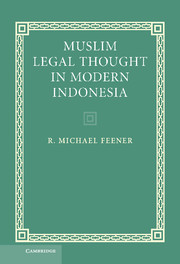Book contents
- Frontmatter
- Contents
- Acknowledgments
- A note on transliteration
- List of abbreviations
- Preface: Toward an intellectual history of modern Indonesian Islam
- 1 Technology, training, and cultural transformation
- 2 The open gate of ijtihād
- 3 An “Indonesian madhhab”
- 4 Sharī ʿa Islam in a Pancasila nation
- 5 New Muslim intellectuals and the “re-actualization” of Islam
- 6 The new ‘ulamā’
- 7 Next generation fiqh?
- Conclusion
- Bibliography
- Index
6 - The new ‘ulamā’
Published online by Cambridge University Press: 29 September 2009
- Frontmatter
- Contents
- Acknowledgments
- A note on transliteration
- List of abbreviations
- Preface: Toward an intellectual history of modern Indonesian Islam
- 1 Technology, training, and cultural transformation
- 2 The open gate of ijtihād
- 3 An “Indonesian madhhab”
- 4 Sharī ʿa Islam in a Pancasila nation
- 5 New Muslim intellectuals and the “re-actualization” of Islam
- 6 The new ‘ulamā’
- 7 Next generation fiqh?
- Conclusion
- Bibliography
- Index
Summary
The teacher then leads the student back over the discipline a second time. He gives him instruction in it on a higher level. He no longer gives a summary but full commentaries and explanations. He mentions to him the existing differences of opinion and the form these differences take all the way through to the end of the discipline under consideration. Thus the scholarly habit is improved.
Ibn Khaldūn (d. 1406), al-MuqaddimaIn the introduction to his volume anthologizing writings characterized as texts of “Liberal Islam” from all across the Muslim world, including Indonesia, Charles Kurzman identified a central preoccupation of liberals without orthodox religious education as being that of “who may speak,” or who holds the legitimate authority to exercise ijtihād. This description could in fact be applied more broadly to nearly all of the major figures discussed in chapter 5 – as well as to the Islamist autodidacts and modern-schooled reformers in chapters 2, 3, and 4. Such issues of authority on religious matters, however, were configured differently for the scholars whose works will be examined in this chapter, as they had formed their understandings of Islamic law within the milieu of pesantren education and were deeply immersed in the texts and interpretive praxis of traditional Muslim scholarly authority.
As discussed in chapter 1, pesantren and the orientations toward Islam which they preserved and disseminated had been the target of a series of Muslim reformist critiques in Southeast Asia since the turn of the twentieth century.
- Type
- Chapter
- Information
- Muslim Legal Thought in Modern Indonesia , pp. 151 - 181Publisher: Cambridge University PressPrint publication year: 2007
- 1
- Cited by

